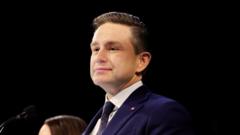In a stunning turn of events, Canada's Conservative Party, which boasted a substantial 27-point lead in pre-election polls, faced a significant setback during the recent elections. Led by Pierre Poilievre, the Conservatives not only failed to capture power for a fourth consecutive time but also saw Poilievre himself lose his long-held seat in Parliament. This defeat has set off a wave of finger-pointing among party members attempting to decipher the reasons behind their failure despite securing nearly 42% of the popular vote, the highest since 2003.
How Canada's Conservatives Squandered a 27-Point Lead: A Deep Dive into Their Recent Election Loss

How Canada's Conservatives Squandered a 27-Point Lead: A Deep Dive into Their Recent Election Loss
After a surprising election loss, Canada’s Conservative Party faces internal turmoil and questions on leadership, unity, and strategy.
As news of the Liberal Party's victory settled in on election night, Conservative supporters were left bewildered, struggling to understand how their party diminished its momentum. According to Conservative strategist Shakir Chambers, there’s a pressing need for healing and unity within the party ranks. Looking forward, the party must focus on functioning effectively as the Official Opposition in light of Poilievre's loss, raising concerns about his continued leadership.
In response to these challenges, Poilievre announced plans to run for a seat in a by-election in Alberta after fellow Conservative Damien Kurek’s decision to step down. Kurek expressed confidence in Poilievre's abilities, stating that the movement has thrived under his guidance. However, shadows loom over Poilievre's future as leader—getting a clear endorsement from party members and navigating a divided base will be critical.
While some Conservatives like Jamil Jivani blamed Ontario Premier Doug Ford for hurting the party's chances by prioritizing his own political narrative, others pointed to Poilievre’s combative demeanor and failure to connect with wider Canadian audiences as additional concerns. Critics note that while Poilievre’s populist style resonated with some constituents, it also alienated potential supporters, especially in eastern Canada.
Furthermore, the absence of support from key provincial Conservative leaders during the campaign has sparked discussions about party unity. Although some premier endorsers rallied behind Poilievre, a lack of unified support could signify a deeper rift that needs addressing. Ford has criticized Poilievre's approach, indicating a need for self-examination within the party to appeal to a broader demographic.
As Conservative stalwarts call for introspection and rebuilding efforts, the overarching question remains: how can the Conservatives effectively unite and reinvent themselves to confront the challenges ahead?
With a caucus meeting scheduled soon, all eyes will be on Poilievre's next moves as the Conservative Party seeks to redefine its strategy moving into a new political landscape.
In response to these challenges, Poilievre announced plans to run for a seat in a by-election in Alberta after fellow Conservative Damien Kurek’s decision to step down. Kurek expressed confidence in Poilievre's abilities, stating that the movement has thrived under his guidance. However, shadows loom over Poilievre's future as leader—getting a clear endorsement from party members and navigating a divided base will be critical.
While some Conservatives like Jamil Jivani blamed Ontario Premier Doug Ford for hurting the party's chances by prioritizing his own political narrative, others pointed to Poilievre’s combative demeanor and failure to connect with wider Canadian audiences as additional concerns. Critics note that while Poilievre’s populist style resonated with some constituents, it also alienated potential supporters, especially in eastern Canada.
Furthermore, the absence of support from key provincial Conservative leaders during the campaign has sparked discussions about party unity. Although some premier endorsers rallied behind Poilievre, a lack of unified support could signify a deeper rift that needs addressing. Ford has criticized Poilievre's approach, indicating a need for self-examination within the party to appeal to a broader demographic.
As Conservative stalwarts call for introspection and rebuilding efforts, the overarching question remains: how can the Conservatives effectively unite and reinvent themselves to confront the challenges ahead?
With a caucus meeting scheduled soon, all eyes will be on Poilievre's next moves as the Conservative Party seeks to redefine its strategy moving into a new political landscape.


















